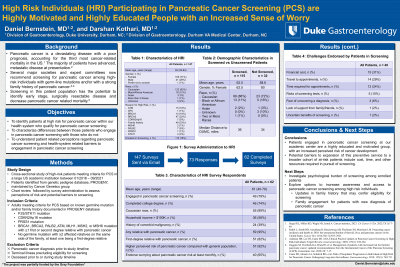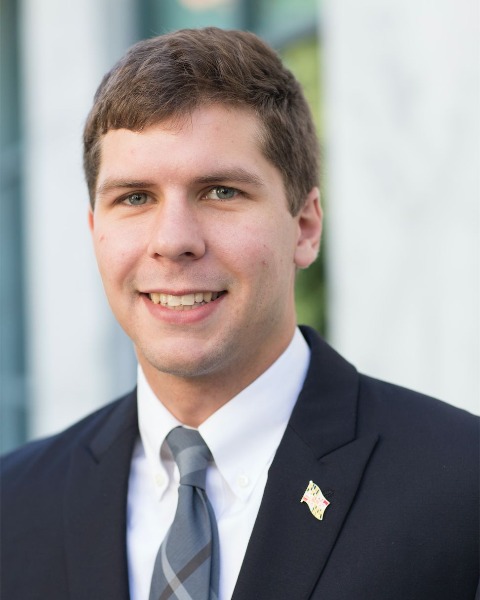Sunday Poster Session
Category: Biliary/Pancreas
P0031 - High Risk Individuals Participating in Pancreatic Cancer Screening (PCS) Are High Motivated & Highly Educated People With an Increased Sense of Worry
Sunday, October 22, 2023
3:30 PM - 7:00 PM PT
Location: Exhibit Hall

Has Audio

Daniel Bernstein, MD
Duke University
Durham, NC
Presenting Author(s)
Daniel Bernstein, MD1, Darshan Kothari, MD2
1Duke University, Durham, NC; 2Duke University School of Medicine, Durham VA Medical Center, Durham, NC
Introduction: Pancreatic cancer is a devastating disease with a poor prognosis accounting for the third most cancer-related mortality in the US. About 10% of cases are associated with germ-line mutations and/or with a strong family history of pancreatic cancer. Studies have led several major societies and expert committees to publish recommendations endorsing PCS in HRI. The goal of this project will be to identify and characterize the HRI who qualify for PCS in our health system, highlight differences between patients who are engaged in PCS with those who are not, and understand potential barriers to screening.
Methods: We performed a cross-sectional survey of all HRI at a single academic institution. HRI were those patients who carried germline mutation and/or had a family history deemed high risk for pancreatic cancer by the CAPS consortium and the ASGE. We performed chart review of all the HRI and also sent an electronic survey to each HRI to understand perceptions, barriers and burden of PCS.
Results: The majority of the 147 patients who met criteria as HRI were female (71%) and Caucasian (83%), of which 78% were enrolled in PCS. There were no significant differences in age, gender, race, insurance status or distance to the medical center differences between those who engaged in PCS and those who did not. Sixty-two HRI (42%) responded to the survey of which 49 of the patients participated in PCS. When asked how they learned about PCS, 51% (25/49) reported self-referral to PCS. Demographic data showed that the HRI had at least a college degree and earned an income of ≥$100,000/year. Further, 39% had co-morbid malignancy of which ¼ had breast cancer. 65% of respondents reported worrying about their risk for pancreatic cancer at least 1/month and 24% reported that they worry at least 1/week, impairing their QoL. Among those respondents who engaged in PCS, they reported the greatest burden to screening was in travel time to the medical center, needing family support for procedures and the cost of testing.
Discussion: In this study, HRI irrespective of engagement in PCS were largely highly educated Caucasian females with high incomes. Furthermore, of the patients who responded to our survey, HRI are motivated to engage in PCS as > ½ self-referred themselves. This group also reported significant worry as it related to their risk of pancreatic cancer nearly ¼ worrying, at least 1/week which affected their QoL. Further studies are needed to fully explore the psychological burden of PCS in HRI.
Disclosures:
Daniel Bernstein, MD1, Darshan Kothari, MD2. P0031 - High Risk Individuals Participating in Pancreatic Cancer Screening (PCS) Are High Motivated & Highly Educated People With an Increased Sense of Worry, ACG 2023 Annual Scientific Meeting Abstracts. Vancouver, BC, Canada: American College of Gastroenterology.
1Duke University, Durham, NC; 2Duke University School of Medicine, Durham VA Medical Center, Durham, NC
Introduction: Pancreatic cancer is a devastating disease with a poor prognosis accounting for the third most cancer-related mortality in the US. About 10% of cases are associated with germ-line mutations and/or with a strong family history of pancreatic cancer. Studies have led several major societies and expert committees to publish recommendations endorsing PCS in HRI. The goal of this project will be to identify and characterize the HRI who qualify for PCS in our health system, highlight differences between patients who are engaged in PCS with those who are not, and understand potential barriers to screening.
Methods: We performed a cross-sectional survey of all HRI at a single academic institution. HRI were those patients who carried germline mutation and/or had a family history deemed high risk for pancreatic cancer by the CAPS consortium and the ASGE. We performed chart review of all the HRI and also sent an electronic survey to each HRI to understand perceptions, barriers and burden of PCS.
Results: The majority of the 147 patients who met criteria as HRI were female (71%) and Caucasian (83%), of which 78% were enrolled in PCS. There were no significant differences in age, gender, race, insurance status or distance to the medical center differences between those who engaged in PCS and those who did not. Sixty-two HRI (42%) responded to the survey of which 49 of the patients participated in PCS. When asked how they learned about PCS, 51% (25/49) reported self-referral to PCS. Demographic data showed that the HRI had at least a college degree and earned an income of ≥$100,000/year. Further, 39% had co-morbid malignancy of which ¼ had breast cancer. 65% of respondents reported worrying about their risk for pancreatic cancer at least 1/month and 24% reported that they worry at least 1/week, impairing their QoL. Among those respondents who engaged in PCS, they reported the greatest burden to screening was in travel time to the medical center, needing family support for procedures and the cost of testing.
Discussion: In this study, HRI irrespective of engagement in PCS were largely highly educated Caucasian females with high incomes. Furthermore, of the patients who responded to our survey, HRI are motivated to engage in PCS as > ½ self-referred themselves. This group also reported significant worry as it related to their risk of pancreatic cancer nearly ¼ worrying, at least 1/week which affected their QoL. Further studies are needed to fully explore the psychological burden of PCS in HRI.
Disclosures:
Daniel Bernstein indicated no relevant financial relationships.
Darshan Kothari indicated no relevant financial relationships.
Daniel Bernstein, MD1, Darshan Kothari, MD2. P0031 - High Risk Individuals Participating in Pancreatic Cancer Screening (PCS) Are High Motivated & Highly Educated People With an Increased Sense of Worry, ACG 2023 Annual Scientific Meeting Abstracts. Vancouver, BC, Canada: American College of Gastroenterology.
